A Touch On The Arm: returning to work after mental health problems
I wrote a poem once about the lack of flowers on psychiatric wards. We who are unwell in the world of feeling are doubly unrecognised. The hill we climb back to wellness is also jagged and steep with zig-zag turns.
The summer was scary. Symptoms I thought buried, returned. A Patient Director who had relapsed to patient-hood. Ironic. Fitting perhaps? I have blogged about the ‘emotional labour’ of being a patient leader before. Words as ghosts come back to haunt.
Post-recovery in the 90s, I lied on my CV about the time I was ‘away’. I called it ‘freelance consultancy’ (boy, was I ‘freelance’!). Disclosure was an impossibility for my career. Like it is for many others. Stigma was (is?) prevalent.
This time, I did not lie. This time I had an employer who not only supported my recovery into wellbeing and my role, but leaders who expressed their love for me. Let me repeat that word: Love.
I also believe it is easier for someone who is in a senior position to be open – we have already gained much professional confidence through our status, and have some credibility. It is unlikely (though I still have this story in my head) that respect for what I have done will dissolve because of what happened in the summer. But what of those more ‘junior’ (not a phrase I like, but you know what I mean)? Can they be as open as me? Hmmm…
I live in hope that my organisation manifests equal love and support for others who are unwell in mind and body. I will be looking for evidence.
Recovery is a dangerous time
A few things though, before we get too dizzy with accolades. What’s my learning about that difficult step back into the office?
I have also written previously that recovery is a dangerous time. When you get back on your feet, they are wobbly. I have a picture of a baby gazelle in my mind. The echo of stifling thoughts and uncomfortable feelings have not disappeared. You are easily triggered. The narrative you have told about what happened – the usual bullshit (I am no good, a failure, can’t do the job, etc) are rocking around. You may ‘look’ better. The scars are invisible and still sore.
When I got back, I was hugged. I was bowled over by affection. One friend who had also been away with a physical problem (of course with emotional consequences too) asked: ‘Did you get a card from the office?’. I said, yes of course. And flowers. And wonderful chocolates. ‘And weren’t those messages from everybody amazing’? She went on. ‘What messages?’ I said.
Then I realised what had happened. The organisation, quite rightly in terms of confidentiality, had not disclosed my illness to others. I had not had the honest conversation with someone to say ‘you can tell people XYZ about what happened to me’. Hence I got a card, but not one signed by everyone.
I now remember that when I got that card, with a ‘love and support from all your friends’, it felt like I was disconnected from all those people who could have voiced their support explicitly. That extra layer of protection further isolated me. I should have said something. That lack of connection made the return to office more unknowing.
The touch on the arm
But here’s the main thing: One or two people came up to me and gently touched me on the arm and asked ‘are you OK’? That touch said so much. It conveyed deep concern, love, kindness. And also uncertainty – not about how I was - but about how to open up a conversation about my mental wellbeing.
To me, and I may be wrong, it said ‘I am here for you, I am happy to listen, happy to be open, but I am unsure how much you want to share’. We needed a way of holding a safe conversation – on my terms of course, but also one that recognises the limits of what others are comfortable with.
I talked to some people who, courageously, said ‘I don’t want to treat you with kid gloves, or patronise you’. We went on to talk about how to have a proper conversation about my unwellness and capacity to take on the refreshed workload. We agreed that if I was hurt or triggered by things they did or said, or if I felt that work was too much, it was my responsibility to say something. And that they would be open to challenge too. Can your organisation or the people within it do this?
Opening
And then there were the people who sidled up to me to talk about their own vulnerability. For me, there are only two things that guide me in my life and work any more – do your best and be kind (to yourself and others). And it is in these sorts for encounters – furtive, gentle, open, adult – that I feel I have most been able to give of myself. By opening up, people have opened up to me.
I know many reading this will have experienced this opening. It is one gift we bring from the cave-world. The touch on the arm is the beginning of something different – it is a strike of connection and light.
As a gibbering and convulsive 2016 comes to an end, what else can we hope for? Keep on doing your best. Keep on at being kind.
Thank you to all my work colleagues – friends - at Sussex MSK Partnership and Here. This is my touch on your arm.
(c) David Gilbert 2016


Thanks David another insightful piece and well written .
Thank you! Let 2017 be much better...
I'm both sorry and heartened to read this David. Best wishes for the coming year.
Here's to 2017 being a better year for you. Best wishes for the festive season too.